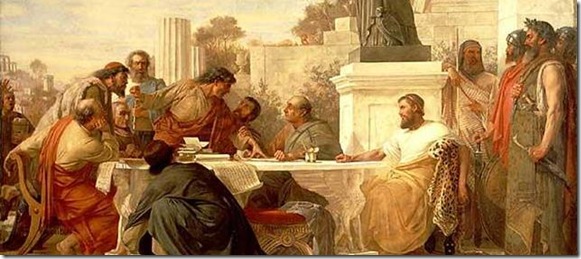Quintus Septimius Florens Tertullianus was born in c. 160 into a pagan Roman family in Carthage, Africa (modern day Tunisia). After being trained in rhetoric and law, Tertullian become a Christian sometime before the year 197. The first important Christian to write in Latin, he is commonly called the “father of Latin (or Western) theology.” His books were so wonderfully crafted that pagans would read them for the sheer enjoyment of his prose. As a fifth century writer put it, “Almost every word he uttered was an epigram and every sentence was a victory.”
With a broad range of rhetorical skills at his disposal, Tertullian was an ardent apologist. Unsatisfied with simply proving his interlocutor’s position to be wrong, he endeavored to totally annihilate his opponents, showing them to be ill-informed, if not morally suspicious.
With Irenaeus, Tertullian vehemently opposed Gnosticism. His treatise titled Prescription of Heretics is perhaps the best known. He was also strongly critical of Marcion, the most popular of the second century heretics.
There is so much to say about Tertullian that despite the tall cup of coffee before me and hours of writing that I’m enjoying on this day off from work, I feel like I’m trying to get a sample of Lake Ronkonkoma with a shot glass. Thankfully, I have found a terrific lecture on the man by historical theologian Gerald Bray titled Tertullian and the Early Church. Professor Bray explains some things that you may already know about Tertullian (e.g., that he coined the term “Trinity” and had an antipathy toward Greek Philosophy) and a host of other things that you likely don’t.
Finally, since Tertullian is so quotable, here is a little taste to incite your interest:
The name of faction is deserved (not by Christians but) by those who conspire to slander good and virtuous men, who cry out against innocent blood. They justify their enmity by the groundless pleas that Christians are the cause of every public disaster, of every affliction visited upon the people. If the Tiber rises to the city walls or the Nile does not rise to the fields, if the heavens stay still or the earth moves, if there is famine of plague, the cry is at once: ‘The Christians to the lion’. What! So many of them to one lion? Apology 40
Your cruelty (against us) does not profit you, however exquisite. Instead, it tempts people to our sect. As often as you mow us down, the more we grow in number. The blood of the Christians is the seed (of the church) . . . The very obstinacy you criticize teaches for us. For who on seeing it is not excited to enquire what lies behind it? Who, having enquired, does not embrace our faith? Apology 50





